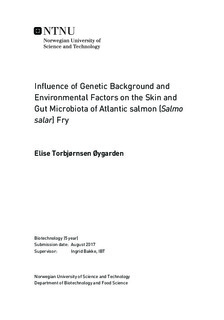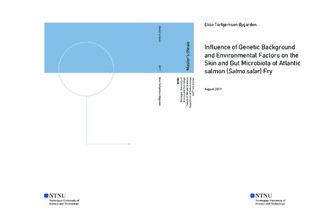| dc.description.abstract | All fish live in symbiosis with complex microbial communities, and the gastrointestinal system (GI) is a natural environment for microbes. The GI microbiota is numerous and diverse, and has important functions for the host. While the GI microbiota of fishes and its effect on development and immunology have been studied for some time, the knowledge about the fish skin microbiota and its host functions is scarce. Like the GI system, the fish skin harbors a complex and diverse microbiota, which lives in close contact and interacts with the surrounding water microbial communities.
The hypothesis of this thesis was that host genotype and diet would influence both the skin and gut microbiota of Atlantic salmon (Salmo salar). This was studied by comparing the microbiota of individuals at 48 days after onset of external feeding, associated with two host types representing an aquaculture and a wild strain. The two host strains had been given three different diets, including either fish oil, vegetable oil, or phospholipid oil. The microbiota was characterized by PCR and subsequent Illumina sequencing of 16S rRNA amplicons.
We found that the water microbiota was more diverse than the salmon fry microbiota, and water and fish did not share the same microbiota. Further, the gut microbiota was more diverse than skin microbiota. The gut and skin microbiota were significantly different from each other, but they shared some of the most abundant operational taxonomic units (OTUs).
Host genotype significantly affected both skin and gut microbiota, indicating host selection on microbiota associated with salmon fry. Surprisingly, diet affected skin microbiota, but not gut microbiota. There was an interaction effect between genotype and diet in skin samples, indicating that the diet might have influenced the skin microbiota also through water microbiota. The skin microbiota of developing salmon might therefore be more affected by water microbiota than gut microbiota. In this thesis we showed that genotype of salmon fry influenced skin and gut microbiota more than diet. | |

